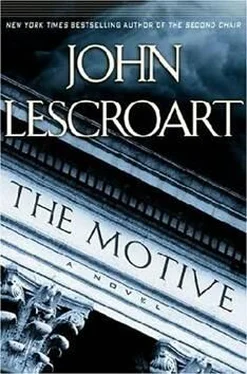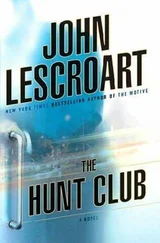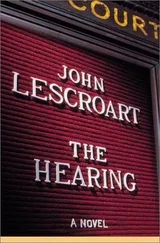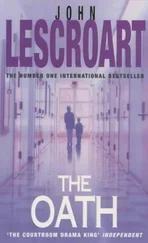Paul had specifically connected. There had to have been a mutual friend or acquaintance. Hardy didn't believe Paul had just picked Missy up somewhere, although, of course, that was also a possibility. Maybe Missy had in fact set her sights on Paul, just as his ex-wife and children suspected, for his wealth and standing.
The galling thing was that he didn't even know why he was continuing with the exercise. Studying numbers, going over the monthly statements page by agonizing page. Deposits, withdrawals, deposits, withdrawals. At one point he looked up and said aloud, "Who cares?" But he kept up the routine. Halfway through, he made himself a double shot of espresso and brought it back to his desk.
No word at all yet from Wes Farrell.
When he finished he checked his watch again and saw that it was nearly nine. He stood and closed the folder, leaving it on the center of his blotter. All that work, like so much of trial preparation, to no avail. The worst thing about it, he thought, was that you very rarely knew what you'd need, so you had to know everything.
Cricking his back, he brought his coffee cup over to the sink, then crossed to the door and opened it. He vaguely remembered a knock on that door in the past hour or so, one of the associates telling him she was leaving, he was the last one left in the building if he wanted to set the alarm on the way out.
In the lobby, dim pinpoints of ceiling lights kept the place from being completely dark, but it was still a far cry from the bright bustling business environment it assumed during the day. Off to his right, through its immense windows, the Solarium's plants and ferns and trees cast strange, shape-shifting shadows that seemed to move, which made no sense in the empty space. Hardy had once had some bad luck in the supposedly empty office, and now curious, he walked over and opened the door to the room. A small bird-sparrows got in through the side door from time to time-swooped down out of one of the trees and landed in the center of the conference table, where it eyed him with a distant curiosity.
Hardy flicked on the lights and walked around the outside of the room. At the door that led out to the small patch of ground that held the memorial bench they'd installed in honor of David Freeman, he stopped and turned. The sparrow was still watching him, too. Hardy opened the door all the way and went outside.
The sides of buildings rose on three sides around him. The "memorial garden" existed thirty-six feet above the Sutter Street sidewalk, with a grilled fence along the parapet on the open side. Hardy sat down on the Freeman bench. It was very still here, and quite dark, with only the barest of muffled sounds coming up from the city below.
He let his burning eyes go closed. His breathing slowed. The passage of time ceased.
And then, suddenly, wide awake, he sat up straight, hyperaware of the silence and emptiness around him. He brought his right hand up to his forehead, whispering,
"Wait." Staring unseeing for another several seconds into the open space in front of him, his head pitched slightly to the side, he sat as if turned to stone. He dared not move, afraid that the still-evanescent thought might vanish with as little warning as it had arrived. He looked at it from one angle, then another, trying to dislodge the force of it. There was the fact itself, and then, far more important, there was what it meant. What it had to mean.
What it could mean nothing else but.
When it appeared that the idea had set-unnoticed by Hardy, the sparrow had flown out to the bench, then off into the night-he went back inside, closing the door behind him. Back at his desk, he hesitated one more moment before opening the folder again.
It was still there, the fact that had finally penetrated. The only significant detail in the mass of minutiae. Just where it had been before, and not a mirage at all.
"It's not a trick question, Your Honor." Hardy was in Braun's chamber first thing in the morning, on three hours of sleep, and was aware that a bit of testiness had found its way into his voice. It didn't bother him too much. "I'm trying to accommodate my witnesses, some of whom, Mr. Rosen might admit, have lives outside of the courtroom. If they are not going to be needed until tomorrow or even next week, I'd like to let them go home or back to their jobs."
"Reasonable enough, Mr. Rosen," Braun said. "Let's answer Mr. Hardy's question, shall we? Is Theresa Hanover your last witness?"
"I don't know how long she'll be on the stand, Your Honor," Rosen said.
"Then it'll be a surprise for all of us. What's your problem here?"
"No problem, Your Honor. I like to keep my options open."
Hardy knew that Braun was not a fan of sarcasm, and so tried with some success to keep the irony in his tone to an acceptable level. "If he changes his mind and calls another witness, Your Honor, you have my word I won't appeal."
Braun's reaction showed that he'd come close, but after the quick squint at him, she directed her words to Rosen. "Defense counsel will not hold you to your statement here, all right? Now, barring last-minute decisions that you'll have every right to make, do the people currently plan to rest after Theresa Hanover's testimony is complete?"
"Yes, Your Honor."
"Thank you. That wasn't so hard, now, was it?" But she didn't wait for him to answer. Instead, she said, "Mr. Hardy, you've got your witnesses here, I take it."
"Yes, Your Honor."
"Good, then…" She started to rise from her couch, pulling her robes around her.
But Hardy interrupted. "There is one other small point we need to discuss, though."
With a frown and a grunt of disapproval, the judge lowered herself back onto the cushions. "And that is?"
"Before I begin my case in chief, I'd like to recall one of the state's witnesses for further cross-examination."
Rosen didn't want any part of this, and shaking his head in disbelief at his opponent's gall, he immediately spoke up in both outrage and indignation. "Your Honor! Mr. Hardy has had his fair chance to cross-examine every one of my witnesses, and now because perhaps he's remembered something that he's overlooked or should have asked the first time, he shouldn't be allowed a second chance. He can just call the witness during his case."
Hardy simply stood at ease, a bland expression on his face, his eyes on the judge. "Your Honor," he said, "further cross-examination of this witness may materially change the way I present my defense."
Rosen didn't believe it. "Sure it will. So first we're supposed to let you know who I'm calling today so you can accommodate your witnesses, and then I tell you and you're stalling anyway." Though he'd addressed Hardy directly, and not the court, Braun didn't seem to notice this morning. "I don't have any other witnesses in court today except Theresa and Sergeant Cuneo. Anybody else we'll have to subpoena again. It could take weeks. Is it one of them?" Rosen asked.
"Do you want to play twenty questions?" Hardy asked. He turned to the judge. "This is ridiculous, Your Honor. I've already spoken to the witness just last night and he told me he'd be happy to come down and talk on the record. He is in fact in this building right now. I didn't need a subpoena to get him to do it. He's interested in the truth."
This brought a guffaw from Rosen. "I bet."
Braun turned on him. "Now that will be enough, Mr. Rosen. Mr. Hardy, who is this witness?"
"Dr. Yamashiru."
"And you say he's here now?"
"Outside in the hallway, Your Honor. I talked to him just before we came in here. There will be no delay at all."
"And your cross-examination will focus on what he's already testified to?"
"Yes, Your Honor. In light of these new facts. His testimony is of course central to the people's case, and I believe these new facts will be critical if the jury is to reach a just verdict."
Читать дальше












